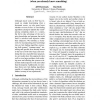Free Online Productivity Tools
i2Speak
i2Symbol
i2OCR
iTex2Img
iWeb2Print
iWeb2Shot
i2Type
iPdf2Split
iPdf2Merge
i2Bopomofo
i2Arabic
i2Style
i2Image
i2PDF
iLatex2Rtf
Sci2ools
100
click to vote
COLING
2010
2010
Knowing What to Believe (when you already know something)
Although much work in NLP has focused on simply determining what a document means, we also must know whether or not to believe it. Fact-finding algorithms attempt to identify the "truth" among competing claims in a corpus, but fail to take advantage of the user's prior knowledge and presume that truth itself is universal and objective rather than subjective. We introduce a framework for incorporating prior knowledge into any fact-finding algorithm, expressing both general "common-sense" reasoning and specific facts already known to the user as first-order logic and translating this into a tractable linear program. As our results show, this approach scales well to even large problems, both reducing error and allowing the system to determine truth respective to the user rather than the majority. Additionally, we introduce three new fact-finding algorithms capable of outperforming existing factfinders in many of our experiments.
| Added | 13 May 2011 |
| Updated | 13 May 2011 |
| Type | Journal |
| Year | 2010 |
| Where | COLING |
| Authors | Jeff Pasternack, Dan Roth |
Comments (0)

